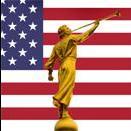

Rhoades
-
Posts
123 -
Joined
-
Last visited
Reputation Activity
-
 Rhoades got a reaction from zil in Depression, pornography, and marriage...
Rhoades got a reaction from zil in Depression, pornography, and marriage...
Your definition of adultery is wrong. The True to The Faith book says, "The Ten Commandments include the command that we not commit adultery, which is sexual intercourse between a married man and someone other than his wife or between a married woman and someone other than her husband."
The woman in the verse doesn't necessarily have to be married for it to be adultery. If the man were married and the woman not married, it would also be adultery.
In the LDS guide to the scriptures on lds.org ( https://www.lds.org/scriptures/gs/adultery?lang=eng) it says this about Adultery: "The unlawful sexual association of men and women. Although adultery generally refers to sexual intercourse between a married person and someone other than his or her spouse, in the scriptures it may also refer to the unmarried. "
In the Church today, that's not how marriage works. Having sex with an unmarried person is NOT the performance of a marriage ceremony. Marriage must be done beforehand.
Here's a scripture that teaches that a married man lusting after another woman (doesn't matter whether she's married or single) is sin:
D&C 42:22-23: “Thou shalt love thy wife with all thy heart, and shalt cleave unto her and none else. And he that looketh upon a woman to lust after her shall deny the faith, and shall not have the Spirit; and if he repents not he shall be cast out.”
I suggest in your studies of these issues, you rely heavily on the basics such as these:
For the Strength of Youth : https://www.lds.org/youth/for-the-strength-of-youth/sexual-purity?lang=eng
True to the Faith: https://www.lds.org/manual/true-to-the-faith/chastity?lang=eng
-
 Rhoades got a reaction from NeedleinA in Depression, pornography, and marriage...
Rhoades got a reaction from NeedleinA in Depression, pornography, and marriage...
Your definition of adultery is wrong. The True to The Faith book says, "The Ten Commandments include the command that we not commit adultery, which is sexual intercourse between a married man and someone other than his wife or between a married woman and someone other than her husband."
The woman in the verse doesn't necessarily have to be married for it to be adultery. If the man were married and the woman not married, it would also be adultery.
In the LDS guide to the scriptures on lds.org ( https://www.lds.org/scriptures/gs/adultery?lang=eng) it says this about Adultery: "The unlawful sexual association of men and women. Although adultery generally refers to sexual intercourse between a married person and someone other than his or her spouse, in the scriptures it may also refer to the unmarried. "
In the Church today, that's not how marriage works. Having sex with an unmarried person is NOT the performance of a marriage ceremony. Marriage must be done beforehand.
Here's a scripture that teaches that a married man lusting after another woman (doesn't matter whether she's married or single) is sin:
D&C 42:22-23: “Thou shalt love thy wife with all thy heart, and shalt cleave unto her and none else. And he that looketh upon a woman to lust after her shall deny the faith, and shall not have the Spirit; and if he repents not he shall be cast out.”
I suggest in your studies of these issues, you rely heavily on the basics such as these:
For the Strength of Youth : https://www.lds.org/youth/for-the-strength-of-youth/sexual-purity?lang=eng
True to the Faith: https://www.lds.org/manual/true-to-the-faith/chastity?lang=eng
-
 Rhoades got a reaction from classylady in Depression, pornography, and marriage...
Rhoades got a reaction from classylady in Depression, pornography, and marriage...
Rather than just remove the duplicate post, I'll address the OP.
In my judgement you've received some good advice, but also lots of bad advice with false doctrine from both sides. Use fasting, prayer, and possibly counsel with trusted priesthood leaders before talking to your wife if that's what you decide. Proceed only if you feel it is best for her and best for your marriage at this time.
-
 Rhoades got a reaction from Vort in Depression, pornography, and marriage...
Rhoades got a reaction from Vort in Depression, pornography, and marriage...
Rather than just remove the duplicate post, I'll address the OP.
In my judgement you've received some good advice, but also lots of bad advice with false doctrine from both sides. Use fasting, prayer, and possibly counsel with trusted priesthood leaders before talking to your wife if that's what you decide. Proceed only if you feel it is best for her and best for your marriage at this time.
-
 Rhoades got a reaction from Backroads in Pushing Back Against the Transgender Bathroom Directive
Rhoades got a reaction from Backroads in Pushing Back Against the Transgender Bathroom Directive
If you are claiming that getting government out of education would make all education problems go away, I disagree.
There are counter examples where government has provided education. Saying government is inherently incapable of providing education discredits whatever point you wanted to make.
Advocating personal debt as the way for the poor to educate their children is a bad idea. This could lead to poor families getting loans to send their children to bad schools in their bad neighborhoods and those kids still end up in poverty and not very educated. And in the end neither parent or child is able to pay back the loans. In some cases, it would just mean no school for the kids.
People would be better off without schooling than to have the state supply it? That's a bold claim. There are many children from bad backgrounds that benefit from a public education system. I've known some personally. If they just stayed in their bedroom playing video games all day or doing drugs with the adults around them I don't think they'd be better off. Yes, there are some bad schools. But not all schools are as bad as no school.
I have seen plenty of bad in schools. I know education is being hindered and damaged by government overreach and ridiculousness. It needs addressed. However, that's not the only problem. Education's huge problem is the lack of family support and societal morals. Privatizing or eliminating schools when everyone is a hoodlum with no morals is not going to make all problems go away.
We actually live in an area right now where public schools are pretty good. We were very familiar with public and private schools in 5 other states and I didn't think such a place existed until we moved here. I think the public schools here are way better than any public or private schools in ID, UT, and AZ for example. For the most part the students come from traditional families who love and support them. Most teachers and local administrators are decent people too. Having good families with morals is the key to good schools. Having good families with morals is the key to good schools. I'll say it again. Having good families with morals is the key to good schools. Even though our schools still have to put up with common core and other garbage like the average US school, they are helping children become well educated and better people. Don't underestimate the importance of morals and the importance of the family.
If you think big organizations inherently can't do anything of worth or value if they are not driven by capitalism, I disagree. One counter example is the Church. This big organization provides Sunday schools and other programs and curriculum to help support our family's gospel learning. Both public schools and Church programs work best if the family plays an active role in the child's education. But, sometimes they work even for children who have no support at home. Both public schools and Church programs work best if good people on the local level implement them and if they help the youth take ownership. Both public schools and Church programs work best if they aren't filled with wasteful activities that do little or no good. Both public schools and Church programs work best if local leaders and teachers are given guidance that is wise and then allowed to adapt to the needs of their students.
I can sympathize with some of the frustration and such with government and schools. However, if you think less government would necessarily fix everything I disagree. Having good families with morals is the key to a good society. In fact, less government when the people can't govern themselves could make things worse.
-
 Rhoades reacted to anatess2 in Pushing Back Against the Transgender Bathroom Directive
Rhoades reacted to anatess2 in Pushing Back Against the Transgender Bathroom Directive
We've been through this many times before, Lehi. And we end up with the same disagreements because you see government-involvement so much more differently than I do. And we'll never agree on it because it is a classic difference in ideology.
The ideology is basically distilled into this classic Utopia (the Thomas Moore book) concept -
“For if you suffer your people to be ill-educated, and their manners to be corrupted from their infancy, and then punish them for those crimes to which their first education disposed them, what else is to be concluded from this, but that you first make thieves and then punish them.”
When I see money spent on public welfare, I don't see it as simply a cost without benefit. I see it as a cost incurred for the benefit of not getting robbed/pillaged/whatever or supporting some thief's accommodations in jail. Now, of course, you can go overboard with welfare (like America's welfare system is now... and about to be with the "free college" demand). But the basic tenet of public welfare is that of avoiding the "making of thieves to punish".
But when it comes to education, a government whose citizenship demands knowledge of the Rule of Law and defines citizenship as a birthright has the obligation to provide literacy for those whose first education disposed them to corruption do that they may retain the rights of citizenship with the knowledge of law.
Of course, literacy doesn't have to be provided for through government public schools... government can provide for it in many ways including "education stamps".
But yes, we'll never agree on this. And that's okay.
-
 Rhoades got a reaction from Steve Noel in Why was Muhammad Wrong?
Rhoades got a reaction from Steve Noel in Why was Muhammad Wrong?
If you are asking "How do you learn true doctrine or how do you know what's true and what's not?"
Some things that help are:
Scriptures (2 Tim 3:15-16) I wonder if the answers in this thread make it seem like we undervalue "it is written". We absolutely use the scriptural canon as a basis to measure things. This is very very important. Prayer (James 1:5) "If any of you lack wisdom, let him ask of God." Leaders called of God like apostles, prophets, pastors, teachers, etc. (Ephesians 4:11-14) These are given to us so we can come to "the knowledge of the Son of God." Righteousness (John 7:17) "If any man will do his will, he shall know of the doctrine". See also 2 Peter 1:4-9 which teaches if you acquire divine attributes such as diligence, faith, temperance, charity, etc. they "make you ... neither barren nor unfruitful in the knowledge of our Lord Jesus Christ.". That's not a complete list. Offhand I also think of fasting with prayer, meditation, and pondering.
But the underlying key to ALL of these is revelation. The Spirit of Truth is the one that helps us know and recognize truth. We can ONLY know the things of God through the Spirit; "the things of God knoweth no man, but [by] the Spirit of God" (1 Corinthians 2:11 with "by" added to clarify its meaning. See also 12-14 which support this; verse 12 teaches we have received the Spirit of God that we might know the things of God.) I'm sure you're familiar with others such as "the Spirit of truth ... will guide you into all truth" (John 16:13)
Another thing to mention is that anything that denies Jesus Christ as the divine Son of God and Savior and the only way to salvation can be rejected. We know this because of scripture, the Book of Mormon as well as the Bible.
Some related teachings from the Book of Mormon include:
Moroni 10:5-6:
5 And by the power of the Holy Ghost ye may know the truth of all things.
6 And whatsoever thing is good is just and true; wherefore, nothing that is good denieth the Christ, but acknowledgeth that he is.
Moroni 7:16-17:
16 For behold, the Spirit of Christ is given to every man, that he may know good from evil; wherefore, I show unto you the way to judge; for every thing which inviteth to do good, and to persuade to believe in Christ, is sent forth by the power and gift of Christ; wherefore ye may know with a perfect knowledge it is of God.
17 But whatsoever thing persuadeth men to do evil, and believe not in Christ, and deny him, and serve not God, then ye may know with a perfect knowledge it is of the devil; for after this manner doth the devil work, for he persuadeth no man to do good, no, not one; neither do his angels; neither do they who subject themselves unto him.
Ether 4:11
11 But he that believeth these things which I have spoken, him will I visit with the manifestations of my Spirit, and he shall know and bear record. For because of my Spirit he shall know that these things are true; for it persuadeth men to do good.
Alma 5:46-48:
46 Behold, I say unto you they are made known unto me by the Holy Spirit of God. Behold, I have fasted and prayed many days that I might know these things of myself. And now I do know of myself that they are true; for the Lord God hath made them manifest unto me by his Holy Spirit; and this is the spirit of revelation which is in me.
47 And moreover, I say unto you that it has thus been revealed unto me, that the words which have been spoken by our fathers are true, even so according to the spirit of prophecy which is in me, which is also by the manifestation of the Spirit of God.
48 I say unto you, that I know of myself that whatsoever I shall say unto you, concerning that which is to come, is true; and I say unto you, that I know that Jesus Christ shall come, yea, the Son, the Only Begotten of the Father, full of grace, and mercy, and truth. And behold, it is he that cometh to take away the sins of the world, yea, the sins of every man who steadfastly believeth on his name.
Here Alma explains that its through the Spirit that he knows truth, including the truthfulness of the scriptures ("words which have been spoken by our fathers").
This leads to something you brought up earlier in the thread that I'm not sure got answered: person X believes one thing and you believe another and you both claim your knowledge is from God. Q: How do I know which is right? A: Use the things I mentioned above and rely on God to guide you. I maybe could have put humility and willingness to follow in that list too, although those are somewhat implied with prayer. If you humbly trust in God and you seek to learn truth from Him, He'll lead you there.
And, if Person X really does believe something that is not true he will have to answer for himself. But I am certain that Jesus is the Christ, the Son of God, and the Savior. And, I am also certain that the Bible and Book of Mormon are true. Like Alma, "I have fasted and prayed many days that I might know these things of myself. And ... the Lord God hath made them manifest unto me by his Holy Spirit." To Latter-day Saints, knowledge of divine truth must be received from God through His Spirit.
-
 Rhoades reacted to anatess2 in Why was Muhammad Wrong?
Rhoades reacted to anatess2 in Why was Muhammad Wrong?
But see... you are looking at it as somebody who already knows the answers. Somebody asking the question has a completely different brain - method of learning, different organization of information, different perspective, in addition to different knowledge etc. - than you. So, what you know is a "wrong question" with your knowledge is a completely "right question" in a different brain seeking knowledge. And a lot of times, someone seeking knowledge doesn't even know where to start... so they just ask the first question that comes to mind that makes logical sense to the asker.
So, that's why, we always say... there are no wrong questions. Ask away. We'll figure it all out as we continue to discuss things.
So, really... it is only the wrong question when we attribute the wrong intent to it. Telling someone it is the wrong question presumes way too much.
-
 Rhoades got a reaction from LeSellers in Why was Muhammad Wrong?
Rhoades got a reaction from LeSellers in Why was Muhammad Wrong?
If you are asking "How do you learn true doctrine or how do you know what's true and what's not?"
Some things that help are:
Scriptures (2 Tim 3:15-16) I wonder if the answers in this thread make it seem like we undervalue "it is written". We absolutely use the scriptural canon as a basis to measure things. This is very very important. Prayer (James 1:5) "If any of you lack wisdom, let him ask of God." Leaders called of God like apostles, prophets, pastors, teachers, etc. (Ephesians 4:11-14) These are given to us so we can come to "the knowledge of the Son of God." Righteousness (John 7:17) "If any man will do his will, he shall know of the doctrine". See also 2 Peter 1:4-9 which teaches if you acquire divine attributes such as diligence, faith, temperance, charity, etc. they "make you ... neither barren nor unfruitful in the knowledge of our Lord Jesus Christ.". That's not a complete list. Offhand I also think of fasting with prayer, meditation, and pondering.
But the underlying key to ALL of these is revelation. The Spirit of Truth is the one that helps us know and recognize truth. We can ONLY know the things of God through the Spirit; "the things of God knoweth no man, but [by] the Spirit of God" (1 Corinthians 2:11 with "by" added to clarify its meaning. See also 12-14 which support this; verse 12 teaches we have received the Spirit of God that we might know the things of God.) I'm sure you're familiar with others such as "the Spirit of truth ... will guide you into all truth" (John 16:13)
Another thing to mention is that anything that denies Jesus Christ as the divine Son of God and Savior and the only way to salvation can be rejected. We know this because of scripture, the Book of Mormon as well as the Bible.
Some related teachings from the Book of Mormon include:
Moroni 10:5-6:
5 And by the power of the Holy Ghost ye may know the truth of all things.
6 And whatsoever thing is good is just and true; wherefore, nothing that is good denieth the Christ, but acknowledgeth that he is.
Moroni 7:16-17:
16 For behold, the Spirit of Christ is given to every man, that he may know good from evil; wherefore, I show unto you the way to judge; for every thing which inviteth to do good, and to persuade to believe in Christ, is sent forth by the power and gift of Christ; wherefore ye may know with a perfect knowledge it is of God.
17 But whatsoever thing persuadeth men to do evil, and believe not in Christ, and deny him, and serve not God, then ye may know with a perfect knowledge it is of the devil; for after this manner doth the devil work, for he persuadeth no man to do good, no, not one; neither do his angels; neither do they who subject themselves unto him.
Ether 4:11
11 But he that believeth these things which I have spoken, him will I visit with the manifestations of my Spirit, and he shall know and bear record. For because of my Spirit he shall know that these things are true; for it persuadeth men to do good.
Alma 5:46-48:
46 Behold, I say unto you they are made known unto me by the Holy Spirit of God. Behold, I have fasted and prayed many days that I might know these things of myself. And now I do know of myself that they are true; for the Lord God hath made them manifest unto me by his Holy Spirit; and this is the spirit of revelation which is in me.
47 And moreover, I say unto you that it has thus been revealed unto me, that the words which have been spoken by our fathers are true, even so according to the spirit of prophecy which is in me, which is also by the manifestation of the Spirit of God.
48 I say unto you, that I know of myself that whatsoever I shall say unto you, concerning that which is to come, is true; and I say unto you, that I know that Jesus Christ shall come, yea, the Son, the Only Begotten of the Father, full of grace, and mercy, and truth. And behold, it is he that cometh to take away the sins of the world, yea, the sins of every man who steadfastly believeth on his name.
Here Alma explains that its through the Spirit that he knows truth, including the truthfulness of the scriptures ("words which have been spoken by our fathers").
This leads to something you brought up earlier in the thread that I'm not sure got answered: person X believes one thing and you believe another and you both claim your knowledge is from God. Q: How do I know which is right? A: Use the things I mentioned above and rely on God to guide you. I maybe could have put humility and willingness to follow in that list too, although those are somewhat implied with prayer. If you humbly trust in God and you seek to learn truth from Him, He'll lead you there.
And, if Person X really does believe something that is not true he will have to answer for himself. But I am certain that Jesus is the Christ, the Son of God, and the Savior. And, I am also certain that the Bible and Book of Mormon are true. Like Alma, "I have fasted and prayed many days that I might know these things of myself. And ... the Lord God hath made them manifest unto me by his Holy Spirit." To Latter-day Saints, knowledge of divine truth must be received from God through His Spirit.
-
 Rhoades reacted to anatess2 in Why was Muhammad Wrong?
Rhoades reacted to anatess2 in Why was Muhammad Wrong?
I'm not trying to speak for Steve. I'm only answering from my experience. The question that I asked about Muslims is the "flip side" of the answer that I asked about Mormons. When I asked this question, I asked it to my husband, so I had the advantage of not having to worry that he would misinterpret the intent of my question. So, I asked him - how do you know that Joseph Smith is a prophet? And he gave me his answer. Now, that would have been sufficient if I understood what he meant by testimony (you don't hear that word often in Catholicism) and revelation by the Holy Ghost (another word that has a different connotation in Catholicism). So, I asked him - how do you know that Muhammed is not a prophet? And he gave me a different facet of the same words - testimony and revelation... the other side, or flip side. That gave me a fuller understanding of what he meant by testimony and revelation.
As somebody who grew up in the Church, my husband took a lot of things for granted, thinking I understand what he means. It took a lot of questions - different ways of asking the same questions, even - for me to get the LDS understanding of certain religious phrases and religious concepts.
And I have said it here many times, a lot of it - and I would even say ALMOST ALL of it - stems from very basic things LDS are taught that are missing from Catholic teaching... like, pre-mortal spirits for example. That very simple, very primary-level thing has VAST ramifications on the understanding of certain concepts. In reference to the OP, what I kept on stubbing my toe on was the concept of open canon, it was not something I was used to and every time my husband would say Testimony, Revelation, Scripture... they all mean slightly different in my brain than in my husband's brain because of it. Scripture is a different thing in Catholicism than in LDS which is also different from Evangelists. Scripture for Catholics is the Holy Bible - the same way it means in Evangelical usage. But, as Evangelicals do not hold anything outside of the Scripture as authoritative, they have a different way of truth-finding than Catholics who hold Sacred Tradition as authoritative as well. Now, not knowing anything about LDS, as a Catholic, I was subconsciously looking for something that equates to Sacred Tradition. An evangelical wouldn't be doing that... rather, they would subconsciously go back to the authority of Scripture which is nothing more than the Holy Bible. It seems like an easy thing to do when I'm trying to explain it in this paragraph. But, as my experience has proven, this "switch" in thinking is a difficult thing to adjust and I found myself asking the same questions in different ways or even in the same way because I never really got it the first time due to my "default" understanding of the role of Scripture and Sacred Tradition.
-
 Rhoades got a reaction from Blackmarch in Why was Muhammad Wrong?
Rhoades got a reaction from Blackmarch in Why was Muhammad Wrong?
If you are asking "How do you learn true doctrine or how do you know what's true and what's not?"
Some things that help are:
Scriptures (2 Tim 3:15-16) I wonder if the answers in this thread make it seem like we undervalue "it is written". We absolutely use the scriptural canon as a basis to measure things. This is very very important. Prayer (James 1:5) "If any of you lack wisdom, let him ask of God." Leaders called of God like apostles, prophets, pastors, teachers, etc. (Ephesians 4:11-14) These are given to us so we can come to "the knowledge of the Son of God." Righteousness (John 7:17) "If any man will do his will, he shall know of the doctrine". See also 2 Peter 1:4-9 which teaches if you acquire divine attributes such as diligence, faith, temperance, charity, etc. they "make you ... neither barren nor unfruitful in the knowledge of our Lord Jesus Christ.". That's not a complete list. Offhand I also think of fasting with prayer, meditation, and pondering.
But the underlying key to ALL of these is revelation. The Spirit of Truth is the one that helps us know and recognize truth. We can ONLY know the things of God through the Spirit; "the things of God knoweth no man, but [by] the Spirit of God" (1 Corinthians 2:11 with "by" added to clarify its meaning. See also 12-14 which support this; verse 12 teaches we have received the Spirit of God that we might know the things of God.) I'm sure you're familiar with others such as "the Spirit of truth ... will guide you into all truth" (John 16:13)
Another thing to mention is that anything that denies Jesus Christ as the divine Son of God and Savior and the only way to salvation can be rejected. We know this because of scripture, the Book of Mormon as well as the Bible.
Some related teachings from the Book of Mormon include:
Moroni 10:5-6:
5 And by the power of the Holy Ghost ye may know the truth of all things.
6 And whatsoever thing is good is just and true; wherefore, nothing that is good denieth the Christ, but acknowledgeth that he is.
Moroni 7:16-17:
16 For behold, the Spirit of Christ is given to every man, that he may know good from evil; wherefore, I show unto you the way to judge; for every thing which inviteth to do good, and to persuade to believe in Christ, is sent forth by the power and gift of Christ; wherefore ye may know with a perfect knowledge it is of God.
17 But whatsoever thing persuadeth men to do evil, and believe not in Christ, and deny him, and serve not God, then ye may know with a perfect knowledge it is of the devil; for after this manner doth the devil work, for he persuadeth no man to do good, no, not one; neither do his angels; neither do they who subject themselves unto him.
Ether 4:11
11 But he that believeth these things which I have spoken, him will I visit with the manifestations of my Spirit, and he shall know and bear record. For because of my Spirit he shall know that these things are true; for it persuadeth men to do good.
Alma 5:46-48:
46 Behold, I say unto you they are made known unto me by the Holy Spirit of God. Behold, I have fasted and prayed many days that I might know these things of myself. And now I do know of myself that they are true; for the Lord God hath made them manifest unto me by his Holy Spirit; and this is the spirit of revelation which is in me.
47 And moreover, I say unto you that it has thus been revealed unto me, that the words which have been spoken by our fathers are true, even so according to the spirit of prophecy which is in me, which is also by the manifestation of the Spirit of God.
48 I say unto you, that I know of myself that whatsoever I shall say unto you, concerning that which is to come, is true; and I say unto you, that I know that Jesus Christ shall come, yea, the Son, the Only Begotten of the Father, full of grace, and mercy, and truth. And behold, it is he that cometh to take away the sins of the world, yea, the sins of every man who steadfastly believeth on his name.
Here Alma explains that its through the Spirit that he knows truth, including the truthfulness of the scriptures ("words which have been spoken by our fathers").
This leads to something you brought up earlier in the thread that I'm not sure got answered: person X believes one thing and you believe another and you both claim your knowledge is from God. Q: How do I know which is right? A: Use the things I mentioned above and rely on God to guide you. I maybe could have put humility and willingness to follow in that list too, although those are somewhat implied with prayer. If you humbly trust in God and you seek to learn truth from Him, He'll lead you there.
And, if Person X really does believe something that is not true he will have to answer for himself. But I am certain that Jesus is the Christ, the Son of God, and the Savior. And, I am also certain that the Bible and Book of Mormon are true. Like Alma, "I have fasted and prayed many days that I might know these things of myself. And ... the Lord God hath made them manifest unto me by his Holy Spirit." To Latter-day Saints, knowledge of divine truth must be received from God through His Spirit.
-
 Rhoades got a reaction from LeSellers in Angels
Rhoades got a reaction from LeSellers in Angels
One thing that particular scripture supports is that angels look like people. (Or at least they can be made to look like people.) I believe they do look like people (and that they are people, although not mortal people). LDS doctrine teaches that spirits, humans on earth as mortals, and resurrected immortals all resemble each other (i.e. have a face, two eyes, legs, arms, etc.)
Agreeable to this is Mark 16:5 which describes when Mary & Mary see an angel: "they saw a young man sitting on the right side, clothed in a long white garment". The angel looked like a young man.
Acts 6:15 says when Stephen was tried, the council "saw his face as it had been the face of an angel". I take that to mean some light or glory was about him yet he still looked like a man.
Other descriptions (such as angels with wings) are just literary symbolism.
-
 Rhoades got a reaction from Vort in Angels
Rhoades got a reaction from Vort in Angels
I think most of the time when we hear the word "angel" we think of messengers of God. These are usually
a) spirits of people that haven't been born yet
b) spirits of those that have departed this life awaiting resurrection
c) resurrected messengers of God
And, of course someone could call another mortal an angel but they're using the word metaphorically.
However, there are some exceptions where the word angels is used in place of spirits. For example, in Jude 1:6 when it says "And the angels which kept not their first estate..." and Matthew 25:41 saying "devil and his angels" In cases such as those, I read it as spirits.
However, I don't think you'd ever find an LDS person using spirits and angels interchangeably. They'd mean a non-mortal with a special calling to act as a messenger of God.
-
 Rhoades got a reaction from classylady in Is LDS theology becoming for 'traditional' 'orthodox'?
Rhoades got a reaction from classylady in Is LDS theology becoming for 'traditional' 'orthodox'?
>> driving belief towards a more traditional understanding?
It's NOT that the doctrine of the LDS church is becoming more traditional. The doctrine is the same. What is happening is that more outsiders who thought LDS doctrine was non-traditional are learning for themselves what the doctrine actually is. The Internet has helped with this, as well as the fact that there are many more members. I've talked to hundreds of other Christians and am well aware that most who think they know LDS doctrine have a wrong understanding. For the few that are open to learning, the more they learn the more they realize most basic truths they already know are agreeable with LDS doctrine. Your quote about "we actually believe that too" made me smile because I find myself thinking that often. I sent my two youngest children to a local Baptist preschool. I have no problems with the doctrines taught. Jesus is our Savior and the only way to salvation. The Bible is true. Jesus created the world. We believe all of that.
>> The less distinctive, the less necessary. In other words, if LDS teaching becomes almost-traditional then what's the point of the Restoration.
Great question. The Restoration was needed to clarify and correct doctrines, but many truths were already around. Think about the non-LDS doctrinal views of baptism. Is baptism even necessary for believers? Does baptism need to be done by immersion? Should infants be baptized? Who can perform the ordinance? There are a variety of differing opinions. The Restoration is a gift from God to clarify truths to the world, including this simple example of baptism. Because of the Restoration, we know who baptism is for, whether it is necessary, and how it is to be done. Additional truths hinted at in the Bible although lost over time were also revealed (such as proxy baptism for the deceased). Although lots of the beautiful truths about baptism (and other doctrines) were already available, the Restoration clarifies and helps increase our understanding. It allows God's children to come in the "unity of the faith" and not be "tossed to and fro, and carried about with every wind of doctrine". (Ephesians 4:13-14). A correct understanding of God and His gospel allows us to develop stronger faith in Him.
In addition to restoring and clarifying some truths, we also need living apostles and prophets. If you teach a people truth and then leave them to themselves, they'll get lost over time. Circumstances come up for which inspired guidance is needed. God uses prophets for timely guidance and direction for the whole body of believers. In addition to giving us timely guidance, the Church with a foundation of apostles and prophets with Jesus as its corner stone is God's way of helping his people become holy (Ephesians 2:19-22).
Lastly, the Restoration provided more than truths. It also provides ordinances and authority.
-
 Rhoades got a reaction from tesuji in Is LDS theology becoming for 'traditional' 'orthodox'?
Rhoades got a reaction from tesuji in Is LDS theology becoming for 'traditional' 'orthodox'?
>> driving belief towards a more traditional understanding?
It's NOT that the doctrine of the LDS church is becoming more traditional. The doctrine is the same. What is happening is that more outsiders who thought LDS doctrine was non-traditional are learning for themselves what the doctrine actually is. The Internet has helped with this, as well as the fact that there are many more members. I've talked to hundreds of other Christians and am well aware that most who think they know LDS doctrine have a wrong understanding. For the few that are open to learning, the more they learn the more they realize most basic truths they already know are agreeable with LDS doctrine. Your quote about "we actually believe that too" made me smile because I find myself thinking that often. I sent my two youngest children to a local Baptist preschool. I have no problems with the doctrines taught. Jesus is our Savior and the only way to salvation. The Bible is true. Jesus created the world. We believe all of that.
>> The less distinctive, the less necessary. In other words, if LDS teaching becomes almost-traditional then what's the point of the Restoration.
Great question. The Restoration was needed to clarify and correct doctrines, but many truths were already around. Think about the non-LDS doctrinal views of baptism. Is baptism even necessary for believers? Does baptism need to be done by immersion? Should infants be baptized? Who can perform the ordinance? There are a variety of differing opinions. The Restoration is a gift from God to clarify truths to the world, including this simple example of baptism. Because of the Restoration, we know who baptism is for, whether it is necessary, and how it is to be done. Additional truths hinted at in the Bible although lost over time were also revealed (such as proxy baptism for the deceased). Although lots of the beautiful truths about baptism (and other doctrines) were already available, the Restoration clarifies and helps increase our understanding. It allows God's children to come in the "unity of the faith" and not be "tossed to and fro, and carried about with every wind of doctrine". (Ephesians 4:13-14). A correct understanding of God and His gospel allows us to develop stronger faith in Him.
In addition to restoring and clarifying some truths, we also need living apostles and prophets. If you teach a people truth and then leave them to themselves, they'll get lost over time. Circumstances come up for which inspired guidance is needed. God uses prophets for timely guidance and direction for the whole body of believers. In addition to giving us timely guidance, the Church with a foundation of apostles and prophets with Jesus as its corner stone is God's way of helping his people become holy (Ephesians 2:19-22).
Lastly, the Restoration provided more than truths. It also provides ordinances and authority.
-
 Rhoades got a reaction from Jane_Doe in Is LDS theology becoming for 'traditional' 'orthodox'?
Rhoades got a reaction from Jane_Doe in Is LDS theology becoming for 'traditional' 'orthodox'?
Agreed. The New Testament teaches that although the faithful will inherit all things, Jesus Christ will still be their God and He shall rule over them. "He that overcometh shall inherit all things; and I will be his God, and he shall be my son." (Revelation 21:7) The King of Kings and Lord of Lords shall rule and reign forever.
Some Christians are hesitant with the "heirs of God" doctrine because they feel like an all powerful being would not be as great and glorious if he can have offspring that he can help to become like him. They feel like it lessens God. But, it's actually the opposite. It adds to His glory and greatness. Someone that helps and lifts others around them is truly great.
This reminds me of the principle taught in Mark 10, when James and John said they wanted to sit with Jesus as he ruled in glory, one on his right and one on his left (vs 37). He taught them that to truly be great, you don't exercise lordship and authority over others like the rulers in this world do (vs 42). Instead, you minister to others. "But so shall it not be among you: but whosoever will be great among you, shall be your minister: And whosoever of you will be the chiefest, shall be servant of all. For even the Son of man came not to be ministered unto, but to minister, and to give his life a ransom for many." (vs. 43-45) God being able and willing to do such great things for us does NOT lessen Him. It makes Him greater.
-
 Rhoades got a reaction from Just_A_Guy in Adam & Eve idea, outside of the box?
Rhoades got a reaction from Just_A_Guy in Adam & Eve idea, outside of the box?
Similarly, I also wonder about children who die in infancy.
In 1800 the estimated global child mortality rate was over 40%. Even in 1950 it was about 20%. This is the percent of people that died before age 5. If throughout the history of the world there were similar child mortality rates, that means a LOT of people didn't get to experience mortality as an adult. The celestial kingdom will be loaded with such people. My guess is that the child mortality rate wasn't always so high, but I really have no way of knowing. Either way, I realize that many many people have a different mortal experience.
-
 Rhoades got a reaction from Just_A_Guy in Adam & Eve idea, outside of the box?
Rhoades got a reaction from Just_A_Guy in Adam & Eve idea, outside of the box?
Sinning isn't needed in order to learn (e.g. Jesus), but opposition is necessary. I don't think he intended for a paradisaical glory to provide us with the necessary opposition. Also, it's important to know that at the end of the millennium there will be much opposition.
-
 Rhoades got a reaction from Traveler in Is LDS theology becoming for 'traditional' 'orthodox'?
Rhoades got a reaction from Traveler in Is LDS theology becoming for 'traditional' 'orthodox'?
Agreed. The New Testament teaches that although the faithful will inherit all things, Jesus Christ will still be their God and He shall rule over them. "He that overcometh shall inherit all things; and I will be his God, and he shall be my son." (Revelation 21:7) The King of Kings and Lord of Lords shall rule and reign forever.
Some Christians are hesitant with the "heirs of God" doctrine because they feel like an all powerful being would not be as great and glorious if he can have offspring that he can help to become like him. They feel like it lessens God. But, it's actually the opposite. It adds to His glory and greatness. Someone that helps and lifts others around them is truly great.
This reminds me of the principle taught in Mark 10, when James and John said they wanted to sit with Jesus as he ruled in glory, one on his right and one on his left (vs 37). He taught them that to truly be great, you don't exercise lordship and authority over others like the rulers in this world do (vs 42). Instead, you minister to others. "But so shall it not be among you: but whosoever will be great among you, shall be your minister: And whosoever of you will be the chiefest, shall be servant of all. For even the Son of man came not to be ministered unto, but to minister, and to give his life a ransom for many." (vs. 43-45) God being able and willing to do such great things for us does NOT lessen Him. It makes Him greater.
-
 Rhoades reacted to Anddenex in Is LDS theology becoming for 'traditional' 'orthodox'?
Rhoades reacted to Anddenex in Is LDS theology becoming for 'traditional' 'orthodox'?
Richard J. Mouw appears to be trying to illustrate that LDS doctrine is seeking to conform to historic/modern orthodox teachings relating to God's nature in comparison to the sons and daughters of God. He provides different thoughts from President Hinckley as evidence of this fact; however, President Hinckley said it best when he said, "Bring all the good that you have and let us see if we can add to it." This invitation is given to everyone.
Scriptural Truth: Confirming Lorenzo Snow's Couplet
1) Jesus is a spiritual offspring of the Father
2) Jesus is God
3) Jesus was once a man (albeit no ordinary man)
4) Jesus is an exalted man (like his Father)
A Father is not lessened when a Son becomes a Father also. The honorably acts of offspring magnify Fathers. The Savior's, Jesus's, atoning act was the greatest act of love for us and the Father, which glorified (magnified) the Father even more. I, as a father, am not debased when my sons/daughters become like me -- I am also magnified.
Modern Scriptural Truth: Confirming Couplet
1) Joseph Smith was visited by two glorified personages, the Father and the Son
2) Joseph learned, and taught, literally we are made in the image of God, the Son being the express image of the Father, and we in the image of both
3) Confirmation of previously expressed truths (Jesus was once a man, and we can become like Christ)
Scriptural Confirmation (Canonical Doctrine) Regarding the Father and President Hinckley:
1) We do not know the life the Father, there isn't much said, "That gets into some pretty deep theology that we don't know very much about" -- true, nothing conforming to orthodox Christian teaching.
2) Nothing concealed, canonical scriptures do not teach anything regarding the life of the Father -- unknown. No reason to discuss on live TV, nor openly public, the origin of the Father when it has not been revealed to the Church collectively.
3) The origin of the Father, if at all, will be revealed through proper proclamation methods to the body of the Church, not through media outlets.
4) The prophets are not unsure, they know God's method of revelation and nothing has been revealed. They may know personally and recognize when to share and when not to share. They accept the First Vision.
Conclusion, Mormonism is not becoming orthodoxy.
-
 Rhoades reacted to Vort in Help... LoC
Rhoades reacted to Vort in Help... LoC
In all honesty, get a different boyfriend. This one cares nothing for you personally, your goals, or what you are trying to achieve. If things are as you say, he is not worth your time. Talk to him once more, just long enough to say "Goodbye, good luck, and never contact me again", then begin your new life as a disciple of Christ who does not have a creepy boyfriend.
Sorry if this sounds unChristlike. I don't think it is. Sometimes we have to do the hard thing, like tell a "boyfriend" that he is no longer any such thing.
-
 Rhoades reacted to NeuroTypical in Best Christmas Gift You Got This Year
Rhoades reacted to NeuroTypical in Best Christmas Gift You Got This Year
My daughter gave me a homemade My Little Pony tie clip to wear to church. It's ok - she gave me Big Mac, and he's a boy pony, so I won't be girly.
-
 Rhoades got a reaction from JojoBag in DH's internet habits...how worried should I be?
Rhoades got a reaction from JojoBag in DH's internet habits...how worried should I be?
You may be confused about what porn is. There's a good LDS video that teaches kids about porn at https://www.lds.org/youth/video/what-should-i-do-when-i-see-pornography?lang=eng
At the 1:35 mark it teaches "pornography means bad pictures of people with little or no clothes on." This supports JojoBag's statement that "racy photos, including bikini shots, lingerie and other such filth are pornography".
One of the points of the video is that when you encounter it you should immediately "call it what it is".
If the images are "racy" with little clothes on, they are porn.
In the "True to the Faith" book, Chastity chapter (https://www.lds.org/manual/true-to-the-faith/chastity?lang=eng) in the "Stay away from pornography" section it teaches "Do not view, read, or listen to anything that depicts or describes the human body or sexual conduct in a way that can arouse sexual feelings."
-
 Rhoades got a reaction from zil in DH's internet habits...how worried should I be?
Rhoades got a reaction from zil in DH's internet habits...how worried should I be?
You may be confused about what porn is. There's a good LDS video that teaches kids about porn at https://www.lds.org/youth/video/what-should-i-do-when-i-see-pornography?lang=eng
At the 1:35 mark it teaches "pornography means bad pictures of people with little or no clothes on." This supports JojoBag's statement that "racy photos, including bikini shots, lingerie and other such filth are pornography".
One of the points of the video is that when you encounter it you should immediately "call it what it is".
If the images are "racy" with little clothes on, they are porn.
In the "True to the Faith" book, Chastity chapter (https://www.lds.org/manual/true-to-the-faith/chastity?lang=eng) in the "Stay away from pornography" section it teaches "Do not view, read, or listen to anything that depicts or describes the human body or sexual conduct in a way that can arouse sexual feelings."
-
 Rhoades got a reaction from MormonMama in DH's internet habits...how worried should I be?
Rhoades got a reaction from MormonMama in DH's internet habits...how worried should I be?
When I encounter such images such as at the grocery store, I call it what it is and turn to look at something else. I'm not afraid to call it what it is. It is pornography.
Why would I call the Bishop? He already knows there's pornography all around. If he wants to find some, he can without needing my help.












